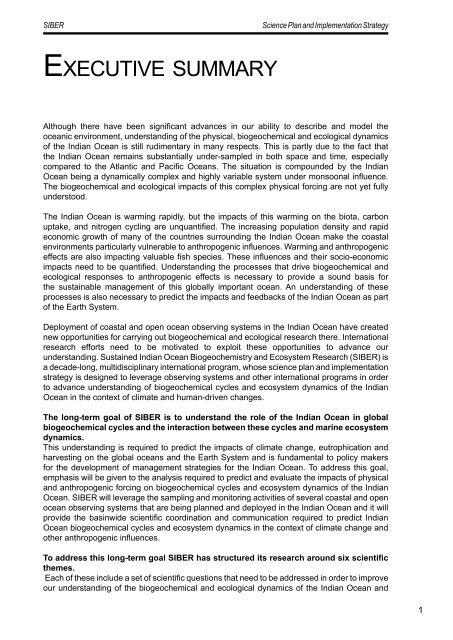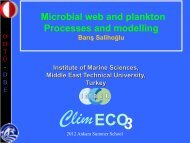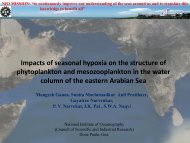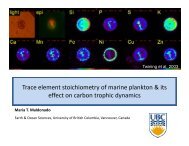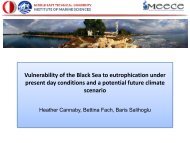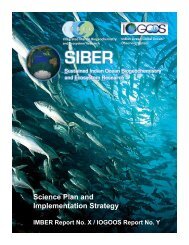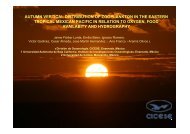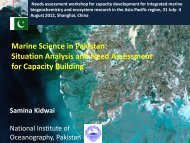SIBER SPIS sept 2011.pdf - IMBER
SIBER SPIS sept 2011.pdf - IMBER
SIBER SPIS sept 2011.pdf - IMBER
You also want an ePaper? Increase the reach of your titles
YUMPU automatically turns print PDFs into web optimized ePapers that Google loves.
<strong>SIBER</strong><br />
Science Plan and Implementation Strategy<br />
Ex e c u t i v e s u m m a r y<br />
Although there have been significant advances in our ability to describe and model the<br />
oceanic environment, understanding of the physical, biogeochemical and ecological dynamics<br />
of the Indian Ocean is still rudimentary in many respects. This is partly due to the fact that<br />
the Indian Ocean remains substantially under-sampled in both space and time, especially<br />
compared to the Atlantic and Pacific Oceans. The situation is compounded by the Indian<br />
Ocean being a dynamically complex and highly variable system under monsoonal influence.<br />
The biogeochemical and ecological impacts of this complex physical forcing are not yet fully<br />
understood.<br />
The Indian Ocean is warming rapidly, but the impacts of this warming on the biota, carbon<br />
uptake, and nitrogen cycling are unquantified. The increasing population density and rapid<br />
economic growth of many of the countries surrounding the Indian Ocean make the coastal<br />
environments particularly vulnerable to anthropogenic influences. Warming and anthropogenic<br />
effects are also impacting valuable fish species. These influences and their socio-economic<br />
impacts need to be quantified. Understanding the processes that drive biogeochemical and<br />
ecological responses to anthropogenic effects is necessary to provide a sound basis for<br />
the sustainable management of this globally important ocean. An understanding of these<br />
processes is also necessary to predict the impacts and feedbacks of the Indian Ocean as part<br />
of the Earth System.<br />
Deployment of coastal and open ocean observing systems in the Indian Ocean have created<br />
new opportunities for carrying out biogeochemical and ecological research there. International<br />
research efforts need to be motivated to exploit these opportunities to advance our<br />
understanding. Sustained Indian Ocean Biogeochemistry and Ecosystem Research (<strong>SIBER</strong>) is<br />
a decade-long, multidisciplinary international program, whose science plan and implementation<br />
strategy is designed to leverage observing systems and other international programs in order<br />
to advance understanding of biogeochemical cycles and ecosystem dynamics of the Indian<br />
Ocean in the context of climate and human-driven changes.<br />
The long-term goal of <strong>SIBER</strong> is to understand the role of the Indian Ocean in global<br />
biogeochemical cycles and the interaction between these cycles and marine ecosystem<br />
dynamics.<br />
This understanding is required to predict the impacts of climate change, eutrophication and<br />
harvesting on the global oceans and the Earth System and is fundamental to policy makers<br />
for the development of management strategies for the Indian Ocean. To address this goal,<br />
emphasis will be given to the analysis required to predict and evaluate the impacts of physical<br />
and anthropogenic forcing on biogeochemical cycles and ecosystem dynamics of the Indian<br />
Ocean. <strong>SIBER</strong> will leverage the sampling and monitoring activities of several coastal and open<br />
ocean observing systems that are being planned and deployed in the Indian Ocean and it will<br />
provide the basinwide scientific coordination and communication required to predict Indian<br />
Ocean biogeochemical cycles and ecosystem dynamics in the context of climate change and<br />
other anthropogenic influences.<br />
To address this long-term goal <strong>SIBER</strong> has structured its research around six scientific<br />
themes.<br />
Each of these include a set of scientific questions that need to be addressed in order to improve<br />
our understanding of the biogeochemical and ecological dynamics of the Indian Ocean and<br />
1


